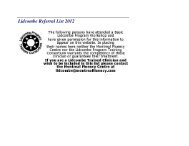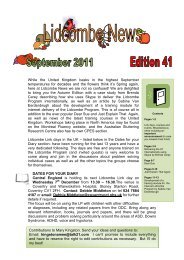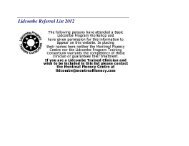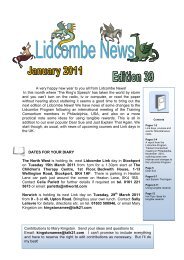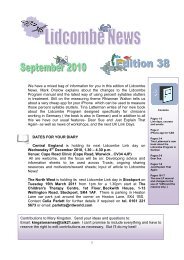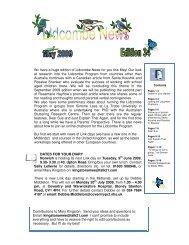Lidcombe News Edition 31st - Montreal Fluency
Lidcombe News Edition 31st - Montreal Fluency
Lidcombe News Edition 31st - Montreal Fluency
Create successful ePaper yourself
Turn your PDF publications into a flip-book with our unique Google optimized e-Paper software.
I mentioned earlier in this article that it was the research which had persuaded<br />
my health Trust to fund my trip to Australia. During the eleven years since we<br />
have implemented the LP in this country, Rosemarie and I who are now the<br />
two UK Trainers for the Consortium, have added to that evidence base.<br />
Initially I ran an audit in Norfolk, which is unpublished, but many of the results<br />
appear in the Bulletin of the Royal College of Speech and Language<br />
Therapists (1999). It was important in that, as Mark Onslow informed me at<br />
the time, it was the first occasion that the Australian results had been<br />
replicated in a different country, and in a different culture. Rosemarie too ran<br />
an audit, which was national, and is summarised in <strong>Lidcombe</strong> <strong>News</strong> edition 15<br />
(January 2003) and is available from the www.montrealfluency.com under the<br />
<strong>Lidcombe</strong> <strong>News</strong>letters section. We will have a look at some further research<br />
which has been conducted in this country, including Rosemarie’s Ph.D, and<br />
some other studies which are not based in Australia, in a later edition of the<br />
<strong>Lidcombe</strong> <strong>News</strong>.<br />
So we continue with the <strong>Lidcombe</strong> Training as it proliferates throughout the<br />
world, offering support where we can through <strong>Lidcombe</strong> Link days in the UK,<br />
the <strong>Lidcombe</strong> <strong>News</strong>, and problem solving by email with individual therapists<br />
who write to us. When I drove to Wolverhampton all those years ago I had<br />
little idea of how that day would change my clinical practice, or indeed my life,<br />
nor how it would help to spread the <strong>Lidcombe</strong> Program throughout the UK and<br />
Europe. Rosemarie and I, and other colleagues who help us co-present the<br />
training, Sally Wynne, Polly Mitchell, Corinne Moffatt and Samantha David,<br />
will, we hope, to continue to work and learn together, offering workshops<br />
where they are requested in the future.<br />
My grateful thanks to Rosemarie Hayhow for her help with this article<br />
References<br />
Hayhow, R. & Enderby, P. (2001) An audit of Speech and Language<br />
Therapists’ use of the <strong>Lidcombe</strong> Program. Unpublished manuscript, Speech<br />
and Language Therapy Research Unit, Frenchay Hospital, Bristol, UK<br />
Kingston, M. (1999, December). Is stuttering a motor speech problem?<br />
Bulletin of the Royal College of Speech and Language Therapists, pp. 9-11<br />
Kingston, M. (1997) The <strong>Lidcombe</strong> Programme comes to Britain. The British<br />
Stammering Association: Speaking Out, Autumn edition<br />
Onslow, M., Packman, A., & Harrison, E. (2003). The <strong>Lidcombe</strong> Program of<br />
Early Stuttering Intervention. Austin, TX: Pro-Ed.<br />
Onslow, M., O’Brian, S. & Harrison, E. (1997). The <strong>Lidcombe</strong> Program of<br />
Early Stuttering Intervention: Methods and Issues. European Journal of<br />
Disorders of Communication, 32, 231-250<br />
Rustin, L. & Cook, F. (1997). Commentary on the <strong>Lidcombe</strong> Program of Early<br />
Stuttering Intervention. . European Journal of Disorders of Communication,<br />
32, 250-258<br />
5



